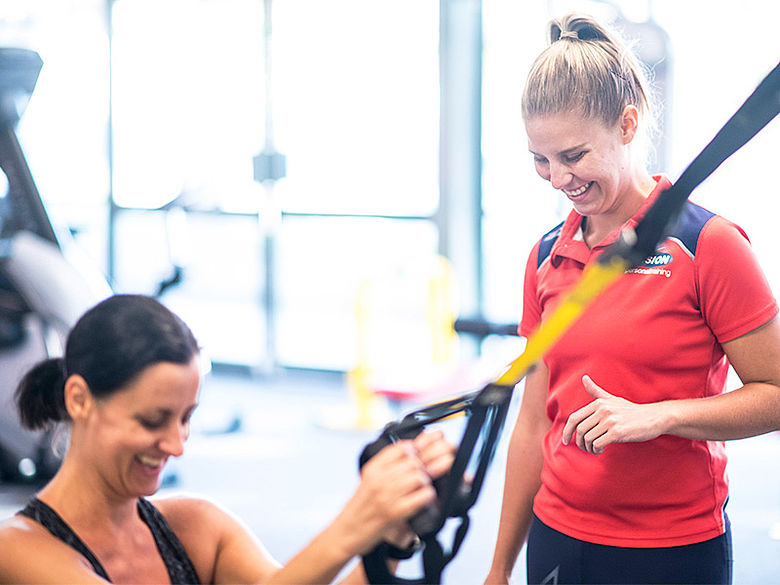Understanding your metabolism and how to adjust it is a great way to help with your weight management outcomes. Let’s look at some of the basics!
Discover Your Body Composition
Doing a body composition assessment, such as Vision’s BIOSCAN, will give you a breakdown of body fat, visceral fat, muscle mass, water, protein, bone density and much more, giving you a deeper understanding of areas to improve your health and what areas you could focus your attention on.
Find out your Resting Metabolic Rate (RMR)
This is the amount of energy, measured in kcal, your body uses to survive at rest. It’s based on several factors including your age, sex, weight and height, where other than total body weight, you do not have control over.
However, RMR does not take into account the energy you use for activity (exercise and non-exercise) or the energy you use when consuming food, both factors that you do have control over. Calculators estimating RMR can be found on the internet, or your coach can help you discover it.
Know the Macro Requirement for your Specific Goals
How much energy you intake via eating and drinking is critical to your weight management success. At Vision, we measure your food intake via tracking macronutrients – carbohydrates, proteins, fats and alcohol. Using BIOSCAN data, we program your macros every 9 weeks to facilitate achieving a specific goal. There is a difference in assigned macros if you want to lose 2 kilos compared to 4 kilos over the same 9 week period. In addition, once a goal has been achieved, to continue the achieving on going goals, new macros must be assigned to account for your new body composition. Failure to do so will result in plateauing and halting of results.
Track Your Food & Drink Intake & Exercise Program
Whether you do this old-school-style in a paper journal, or using an app like MyVision, it is essential to know how the calories you are taking in balances with the calories you’re expending. Generally, to lose weight you need to consume fewer calories than you expend and to gain muscle you need to consume more calories. Yes, the detail can be more nuanced than this but from personal experience this simple approach almost always works.
The following points will give you a good estimate of your metabolism and how your food and physical activity sit with it. From here, there are some simple steps you can take to influence your metabolism and improve your weight management outcomes:
- Lift Weights - Resistance training to build muscle is a great way to move more and burn a few calories. However, and more importantly, having more lean muscle mass increases your RMR. Every pound of muscle on your body burns approx. 6kcal a day compared to every pound of fat which burns only 2kcal. Which means, you’ll burn more calories even when you’re just sitting down and not exercising!
- Move Move - Just being more active during the day, whether it be going for a regular 10 minute walk or standing instead of sitting at a desk, weeding the garden or taking the steps rather than an escalator, will cause you to burn more energy. Simple things like this can add hundreds of extra calories per week of additional energy expenditure. Everything you do, expends energy.
- Drink Lots of Water - Dehydration has been shown to negatively influence your metabolic rate and in-turn, reduce the amount of energy your body burns at rest. So, any additional calories you may have consumed could then have an increased chance of being stored as fat, where otherwise would have been burnt up during the day. Also, drinking water helps you feel fuller and can work as great solution to curbing cravings, reducing the need for unnecessary snaking.
- Eat Regular, Balanced Meals - Eating small meals or snacks every 3-4 hours can help keep your metabolism burning at a higher rate due to the Thermic Effect of Food. The energy your body must use to process food though your digestive system. Additionally, if you include a source of protein in each meal, this will burn more calories because the body must use more energy to digest protein while also stimulating muscle protein synthesis, increasing your body’s ability to build lean muscle mass and in turn, increasing your RMR further.
- Avoid Skipping Meals - Lowering your caloric intake too far negatively influences your metabolism. Why? The body is always trying to maintain homeostasis. Any time it senses it’s being deprived of energy, it reduces RMR by up to 20%, and bearing in mind that RMR makes up 70% of the energy your body burns, it can have a drastic negative effect on your metabolism.
Your body will always try to find an energy balance between intake and expenditure. Acclimatising your body to low calorie diets could mean a higher chance of gaining weight in the future, because you will have to maintain strict control of your intake constantly and any additional calories will quickly result in you being in an energy surplus. An energy surplus means a higher likelihood to increase overall body mass.
Sources:
1. The difference between RMR and BMR:
https://www.acefitness.org/fitness-certifications/ace-answers/exam-preparation-blog/616/bmr-versus-rmr/
2. BMR calculator:
https://www.bodybuilding.com/fun/bmr_calculator.htm
3. The link between dehydration and metabolism:
http://pwlclincoln.com/the-link-between-dehydration-and-metabolism/

